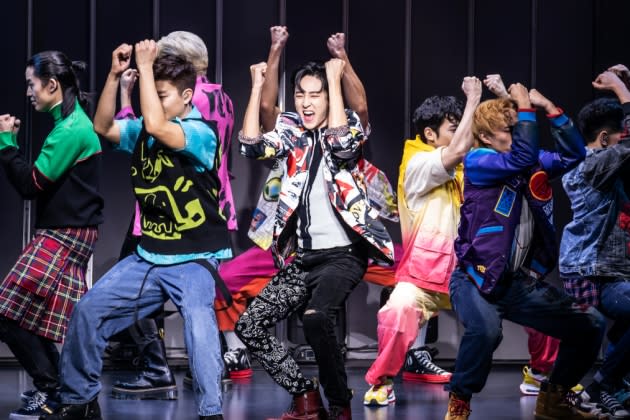‘KPOP’ Review: South Korea’s Explosive Pop Export Hits Broadway With Authenticity and Flash

As defined by boy bands like BTS and girl groups like Blackpink, K-pop – gayo – is a Korean musical genre (‘brand’ is better) where Instiz all-kills (chart domination) is essential and daesang (victory) is a must. Fueled by a uniform style of electronic pop steeped in hip hop and R&B, patchwork costuming and an interlacing network of controlling management, production houses and labels, the smartly-dressed young men and women of gayo harmonize and dance in unison. Only occasionally does a stand-out personality (e.g., BTS’ J-Hope, Blackpink’s Rosé) rise to the fleeting possibilities of individualism.
K-pop, the genre, is as contagious and deeply human as it is cold and calculating. “KPOP,” the musical, understands that, bringing to Broadway a rousing portrait of the minutiae of the industry, from its personal struggles and vexing complexities to its infectious musicality.
More from Variety
With mega-watt set design, exquisite choreography, a show-within-a-show storyline and a score that sounds more like a Spotify playlist than a conventional musical’s tunes, “KPOP” is elegant, energetic, and exceptional. It’s a cleverly playful dramedy wrapped around a concert and stuffed inside the enigma of what it means to want fame – badly – then get it, with all its risks and losses spilled onto the stage.
That one of the show’s actors, Luna – the South Korean singer once a member of K-pop band f(x) – plays the role of a superstar called MwE (pronounced “Mwee”) lends Jason Kim’s book authenticity and earnestness, two qualities that aren’t usually associated with this genre. Slick songwriter Helen Park and her arch co-composer Max Vernon (whose cabaret-rock musical “The Tattooed Lady” is currently premiering in Philadelphia) are along with Kim for the (G-rated) bumping, grinding ride, give “KPOP” both a sense of alt-theatricality and a set of songs that sound as if they were yanked from Variety’s Hitmakers section.
In addition to several dark, electro-pop tracks (e.g. “Amerika” with its caustic “generika” rhyme scheme), the pair write merrily melodic and frenetically rhythmic dance tracks that mimic every twitch of K-pop’s soundscape. Grand songs such as “Super Star” fit perfectly within the glittering, sonically bombastic story of MwE, and with the way she (and, in a separate plotline, boy band singer Brad, played by Zachary Noah Piser) navigate the travails of a fictional, authoritarian K-pop corporation called RBY Entertainment. The perils of stardom have trapped MwE in fame’s bubble. She’s written sensitive, non-K-pop songs such as the acoustic-guitar tune “Mute Bird” but knows RBY would never let her record them.
Run with an iron fist by Ruby (Jully Lee), a one-time vocalist who blew her big chance 20 years ago, “KPOP” opens on a filmed dress rehearsal for the big launch of MwE in New York. This same gig doubles as the label’s introduction of the girl group RtMIS (pronounced “Artemis”) and the boy band F8 (“Fate”).
When MwE breaks down during the rehearsal and jeopardizes RtMIS’ grand debut, the script moves back and forth in flashback to reveal the backstory, making MwE’s steely, success-driven character happily human — and providing fodder for the “Behind the Music”-like spectacle filmed by its fame-hungry director Harry (Aubie Merrylees).
Performed primarily in English with occasional Korean lyrics and dialogue, many of the musical’s songs (like “Bow Down”) have tenuous connective tissue to the musical’s narrative and play like typical radio fare. Pay attention though and you hear the dynamics of the storyline’s drama played out in smartly spun lyrics that touch tenderly on MwE’s emotional life, with songs like “Wind Up Doll.” Piser’s Brad – a Korean-American singer brought into the all-Korean F8 at the risk of resentful bandmates – is also given a song about his difficulties fitting in, communally, with “Halfway.” (That one character yearns for brotherhood while another wants to claim her individuality makes for a lovely grace note in the musical’s intertwining plotlines.)
The multi-talented performers interact exquisitely with each other (and convincingly hit K-pop’s standards of uniformity), as Kim’s bright, delightful book leaves room to reveal each character’s deep yearning to be seen as an individual while understanding what it takes to succeed. The vulnerability behind what it takes to go big or go home is the secret, beating heart of “KPOP,” a pulse that brings life to every chorus of its playlist.
Best of Variety
Sign up for Variety’s Newsletter. For the latest news, follow us on Facebook, Twitter, and Instagram.
